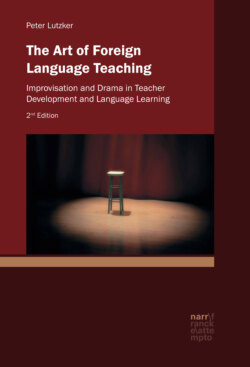Читать книгу The Art of Foreign Language Teaching - Peter Lutzker - Страница 74
На сайте Литреса книга снята с продажи.
6.5 The End of the Workshops
ОглавлениеThere are two kinds of endings to the workshops. The one that always occurs involves sitting around in a circle for about 15–20 minutes and being given the opportunity to say something briefly to each other and to Gladwell. (There are also anonymous feedback sheets handed in at the end of each English Week). In contrast to the many lengthier letters which I was later to receive from participants, the verbal feedback given at the end of the workshops I attended was generally quite short. (In the English Week workshops, this last session occurs the morning after a very late social evening, so there is often a general feeling of fatigue.) The following comments, taken verbatim from the participants at the end of the English Week 2004, are also representative of statements which I heard at the end of the other workshops I attended:
I’m the one who has to have plans. I got the experience that it was OK for me not to have plans. It was completely liberating for me. It was great!
It was new for me going into the empty space, trusting something will happen. Living in the present. Going out with nothing.
I’ve learned to bear the eye contact with the audience. They’re watching you and you have to bear it.
We have grown into a big family in such a short time. You guided us so gently. The most important thing is that nothing can go wrong.
I liked the lightness. It was astonishing to see in what a short time such developments took place.
Clowning for me is the moment of truth. Having the feeling you don’t have borders. Also being yourself and everybody else at the same time. Not really paying attention. I’ll take everything with me and enjoy all the moments of remembering our work.
Somehow strange. It was very touching for me. It’s nice to be on stage. It felt good. Afterwards, it will be hard to do it again.
I loved all these games when everybody’s doing it – but to do it alone…
The second ‘ending’ which does not necessarily occur in all of his courses, but which is a mainstay of his English Week courses, is the final solo improvised performance in front of the entire conference. In the final plenary session of the English Week, all the different artistic groups usually present excerpts from their work, which may include dramatic scenes, poetry readings, and group or individual stories. A number of new participants confided to me that if they had known at the beginning of the week that they were going to have to improvise alone in front of an entire conference with more than a hundred fellow English teachers, they would have immediately switched groups! Some participants who had been to previous English Weeks and knew that this was going to happen wrote that it was often their fear of having to do this that had made it so difficult for them to join the clowning group until this point, despite the fact that they had very much enjoyed seeing others doing this final performance in previous years.
Each participant in the clowning group does a simple crossing. Entering from the sides of the large plenum room, initially hidden behind large screens, each clown with his or her own chosen costume and red nose crosses individually in front of the entire room just walking from one side to the other; having by this time learned that the only way to be sure that something interesting will happen along their way is to not have the slightest idea beforehand of what this something could possibly be.
